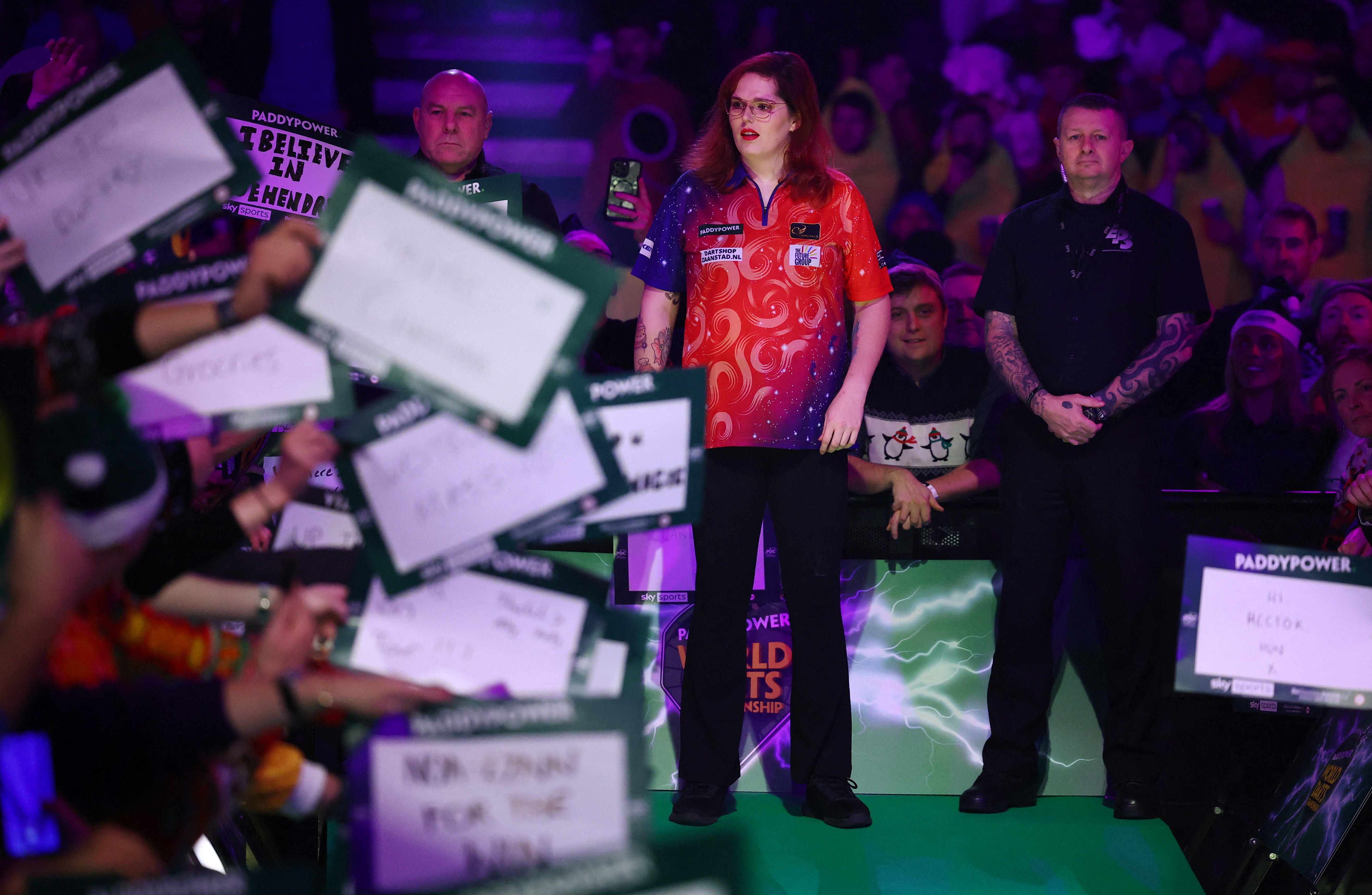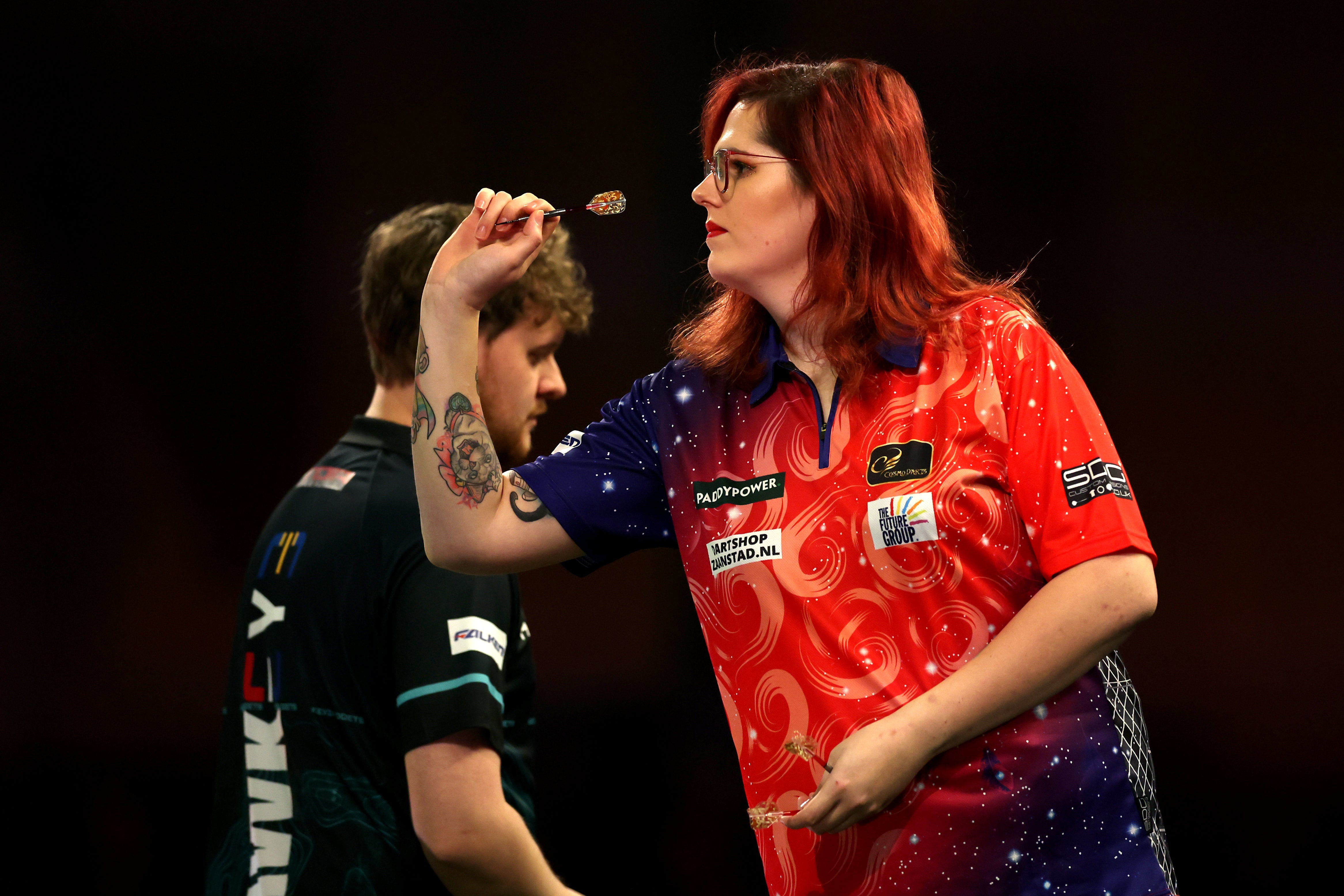As Noa-Lynn van Leuven approached the stage, red hair flowing and lipstick shimmering under the lights, it was hard to know what the reaction would be.
Throughout the long history of sporting crowds, from the Colosseum of Rome to this cathedral of darts just off the north circular, at their most basic level they can choose a binary response to their environment, with cheers or with boos. How would the World Championship at Alexandra Palace respond to its first transgender competitor?
A few minutes earlier there had been a gentle hum of boos as Van Leuven’s face was displayed on screen for a pre-match interview. There were a few wolf whistles as she stepped to her mark at the start of the runway. But if there were any murmurings of disapproval as she stepped on stage, they were drowned out firstly by her walkout song, Euphoria by Loreen, and then by the majority of giddy fans.
Perhaps the people sitting around this collection of folding tables in Alexandra Palace are a useful bellwether for the great British public, distilled down to its most revered cultural tradition: a giant stag do. It was 1pm on a Tuesday afternoon and most of the room was already half-cut, when in walked a transgender athlete. And, broadly, she was welcomed.
Indeed there was a tangible swell of support for Van Leuven’s cause as the match wore on, as she showed her skill to win the first set and later battled to keep pace with the improving Kevin Doets.

Van Leuven’s average of 87.02 was only just below Doets, while she threw six 180s compared to his three. Perhaps the turning point was a moment in the second set when they shared an amazing flurry of missed doubles, the sort of thing every amateur has experienced in the pub or on the board in their garden shed. Van Leuven was stuck on five, Doets on two, and it took 33 darts for him to win the comical leg. As Van Leuven sighed, Doets bowed to the crowd and put an imaginary gun to his head.
Doets made it 1-1, then got ahead and stayed ahead to win the third set, and Van Leuven responded by raising her level in the fourth, twice throwing back-to-back 180s to get the crowd on their feet. But she couldn’t close out the nine-darter either time, and it proved costly as Doets finished the match, winning 3-1.
“I didn’t expect the crowd to be really terrible,” Van Leuven said afterwards. “I hope they were with me, I guess they were with me. They just want to see good darts. And I guess both Kevin and I showed some good darts.”

Perhaps what felt most notable was that her appearance was barely notable. As refrains of “stand up if you love the darts!” and “please don’t take me home!” rang around the arena, there was the sense that no one really noticed, or were particularly fussed, by who was playing.
That sentiment was echoed by her opponent who embraced Van Leuven after his victory. “When I’m on stage, I don’t care who I play,” Doets said after setting up a second-round clash with the world No 2, Michael Smith.
It has not been hard to find far harsher voices over the past year, from Van Leuven’s disgruntled opponents on the women’s tour to her own Dutch teammates who boycotted the national team in protest against her. Martina Navratilova’s tweet that Van Leuven’s victory in a women’s competition “stinks” carried with it a torrent of online abuse.
What gives her the strength to keep playing? “It’s my love of darts,” she said. “It’s just a great game. I love the game and I just want to play. And why does it matter who you are? Anyone who’s discriminating against me or being terrible about me, it says more about them than me.”
Her critics say there is some advantage gained in male puberty, even though Luke Littler was beating professional adults at 10 years old and had hit a nine-darter by 13. They claim there is advantage in height and reach, even if the woman she beat to be here, Beau Greaves, is 6ft tall; even if the greatest of all time, Phil Taylor, is 5ft 7in.

There is nothing in the PDC’s rules to say she cannot compete, or that she carries unfair advantage on the women’s tour, or that she’s harming competition. The concerns about safety often used against transgender athletes in boxing and rugby don’t apply here. The PDC stipulates that players must prove their testosterone level is below 10 nmol/L for the year prior to competing, but otherwise it is open to transgender competitors at a time when a wave of sports have closed their doors.
“The PDC have been really supportive towards me, towards anyone,” she said. “They stand behind their own rules… I think it’s great to see what they’re doing. If you look at other sports, I guess it’s the easy way out just to ban trans people if they’ve gone through male puberty, they’re not allowed to play anything anymore. In the UK, it’s terrible.”
And look, some people just won’t be convinced. The comments sections of certain news organisations are almost certainly absolute bonfires of hate on this one, hate which if you dare bring your nose close enough carries a whiff of fear. But real fear is feeling trapped in the wrong body. Van Leuven says she was bullied as a teenager and felt deeply depressed, and she had to choose: “End it, or I can live as who I want to live,” she told the Guardian.
“I stopped playing darts for a few years because I was unhappy with myself,” she said here, adding that it had cost her crucial experience at the elite level.
So isn’t it better that a transgender woman goes about her business in this, a sport without physical favour? Perhaps her performance here inspired someone to keep participating in sport, or maybe even in life. She threw her darts, lost, and waved goodbye to the crowd. By now, of course, most of them were deeply drunk. And they cheered.





